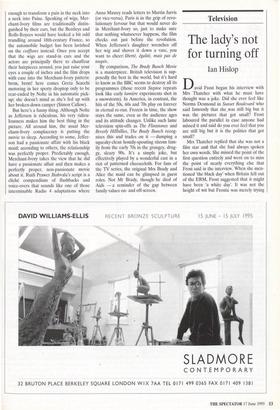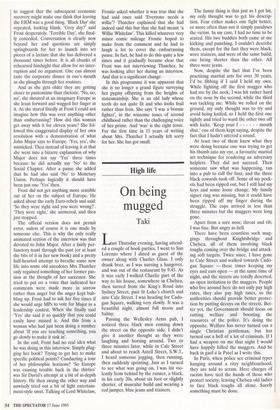Television
The lady's not for turning off
Ian Hislop
David Frost began his interview with Mrs Thatcher with what he must have thought was a joke. Did she ever feet like Norma Desmond in Sunset Boulevard who said famously that she was still big but it was the pictures that got small? Frost laboured the parallel in case anyone had missed it and said do you ever feel that you are still big but it is the politics that got small?
Mrs Thatcher replied that she was not a film star ant that she had always spoken her own words. She missed the point of the first question entirely and went on to miss the point of nearly everything else that Frost said in the interview. When she men- tioned 'the black day' when Britain fell out of the ERM, Frost suggested that it might have been 'a white day'. It was not the height of wit but Frostie was merely trying to suggest that the subsequent economic recovery might make one think that leaving the ERM was a good thing. 'Black Day' she repeated, looking blank. 'Grey day?' said Frost desperately. 'Terrible Day', she final- ly conceded. Conversation is clearly now beyond her and questions are simply springboards for her to launch into set pieces of a lecture that she has delivered a thousand times before. It is all chunks of rehearsed hindsight that allow for no inter- ruption and no argument. One can almost taste the corporate dinner in one's mouth as she ploughs through her routines.
And as she gets older they are getting closer to pantomime than rhetoric. 'No, no, no', she shouted at an imaginary Europe as she leant forward and wagged her finger at it. As she stared fixedly at Frost I could not imagine how this was ever anything other than embarrassing? How did this woman get away with it for eleven years? She fol- lowed this exaggerated display of her own resolution with a demonstration of what John Major says to Europe. 'Yes, yes', she mimicked. Then instead of leaving it at that she went into a bizarre explanation of why Major does not say 'Yes' three times because he did actually say 'No' to the Social Chapter. After a pause she added that he had also said 'No' to Monetary Union. Perhaps logically it should have been just one 'Yes' then.
Frost did not get anything more sensible out of her on the subject of Europe. He asked about the early Euro-rebels and said: `So they were right and you were wrong?'. `They were right,' she answered, and then just stopped.
The official version does not permit error, unless of course it is one made by someone else. This is why the only really animated section of the interview was that devoted to John Major. After a fairly per- functory trawl through the past (or at least the bits of it in her new book) and a pretty half-hearted attempt to breathe some new life into some old anecdotes Mrs Thatcher only regained something of her former pas- sion at the thought of her successor. She tried to put on a voice that indicated her comments were made more in sorrow rather than anger but the anger kept bub- bling up. Frost had to ask her five times if she would urge MPs to vote for Major in a leadership contest. When she finally said `Yes' she said it so quickly that you could easily have missed it. And this from a woman who had just been doing a number about 'If you are teaching something, you go slowly to make it sink in'.
In the end, Frost had no real idea what he was doing in this interview. Simply plug- ging her book? Trying to get her to make specific political points? Conducting a tour of her philosophic horizons? 'So Europe was causing trouble back in the thirties' was Sir David's attempt at a bit of in-depth history. He then swung the other way and unwisely tried out a bit of light entertain- ment-style smut. Talking of Lord Whitelaw, Frostie asked whether it was true that she had said once said 'Everyone needs a willie'? Thatcher explained that she had indeed said this but that she had meant 'a Willie Whitelaw'. This killed whatever very minor comic mileage Frostie hoped to make from the comment and he had to laugh a lot to cover the embarrassing pause. In fact, he had to do this quite a few times and it gradually became clear that Frost was not interviewing Thatcher, he was looking after her during an interview. And that is a significant change.
In this programme it was apparent that she is no longer a grand figure surveying her pygmy offspring from the heights of statesmanship. She is an old lady whose teeth do not quite fit and who looks frail rather than Iron. She says 'I was a bonnie fighter', in the winsome tones of second childhood rather than the challenging voice of her prime. And 'was' is the right tense. For the first time in 15 years of writing about Mrs. Thatcher I actually felt sorry for her. She has got small.



































































 Previous page
Previous page